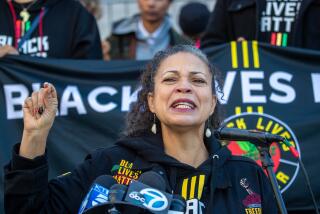Rev. Chavis, Rights Activist, to Head NAACP
- Share via
ATLANTA — The NAACP chose a 45-year-old lifelong civil rights activist as its new executive director Friday and pledged that it was entering a new period of aggressive expansion and revitalization.
The Rev. Benjamin F. Chavis Jr., of Cleveland, a leader in the fight against “environmental racism” and executive director of the United Church of Christ’s Commission for Racial Justice, succeeds the retiring Benjamin L. Hooks, who is stepping down after 15 years at the helm of the 84-year-old civil rights organization.
Chavis, who was chosen from a field of three finalists after a yearlong selection process, said his goals include intensifying the NAACP’s lobbying in Washington, putting more pressure on banks to invest in African-American communities, creating an endowment for the NAACP, increasing membership and making the venerable organization more relevant to young people.
African-American political and community leaders must implement “a common agenda of economic and political empowerment,” Chavis said. “We will make the NAACP a vibrant organization for all our people. . . . We will succeed.”
He acknowledged the size of the task, especially of appealing to young people who have never experienced segregation and who may question the relevancy of the NAACP in their lives.
“I predict the NAACP will be actively involved in trying to stymie (gang violence),” Chavis said. Noting the relationship between high unemployment and racial disparities and gang membership, he said: “When the young people lay down their weapons, what are they going to pick up? We need to come up with some answers. . . . “
Pointing out that he has lived in Harlem and plans to travel to South-Central Los Angeles next week, Chavis, who holds a Ph.D. from Howard University, said he is no stranger to inner-city youth. “I know the brothers and sisters in the hoods,” he said.
But he said the National Assn. for the Advancement of Colored People is not structured as a social service organization. “Our forte has to be social change, impacting the public policy debate that effects the hopelessness in our communities.”
NAACP officials declined to give a breakdown of the vote. Other finalists for the job were Jewell Jackson McCabe, 47, founder of the National Coalition of 100 Black Women, and Earl Shinhoster, 42, the NAACP Southeastern regional director.
The Rev. Jesse Jackson, the most charismatic and well-known applicant, withdrew from consideration Wednesday, as it was becoming increasingly clear that his candidacy was in trouble. In withdrawing, Jackson cited a proposed change in the organization’s constitution that he said would weaken the executive director position.
Since 1985, Chavis has been executive director and chief executive officer of the Commission for Racial Justice, which is affiliated with the 1.7-million member United Church of Christ. He also was a member of the Clinton-Gore transition team dealing with natural resources.
In 1990, he convened the First National People of Color Environmental Leadership Summit in Washington, bringing together 800 leaders of African-American, Latino, American Indian and Asian-American communities to address environmental hazards facing minority communities, in part, as the result of the concentration of toxic waste dumps in those areas.
Dr. William F. Gibson, chairman of the NAACP’s national board of directors, said the 64-member board had wanted a strong administrator with proven fund-raising skills, and Chavis not only fulfilled those requirements but had been involved in civil rights struggles since his youth in North Carolina.
While protesting against school desegregation in North Carolina in the 1970s, Chavis was arrested as one of a group of activists called the “Wilmington 10.” He was convicted of arson and conspiracy to commit assault and sentenced to 34 years in prison. He served four years before the convictions were overturned by a federal appeals court. Amnesty International, the human rights group, described him as a political prisoner.
Controversy over Jackson’s candidacy and withdrawal had threatened to overshadow Chavis’ selection, with several influential board members angrily criticizing the two-time presidential candidate.
After Jackson dropped out, there was talk of scrapping the selection process and starting over again or adding other names to the list of finalists. None of that was done, however. Chavis won on the first ballot.
Chavis acknowledged the “tensions and anxieties surrounding the process of selecting a new executive director” and asked all candidates for the job to work with him toward strengthening the 500,000-member organization.
“Working together,” he said, “we will bring forth an inspiring vision of a more just, compassionate and prosperous America, of a nation where all of its people, irrespective of race, class, gender or ethnic background, can live lives of decency and dignity.”
Profile: Benjamin Chavis
* Age: 45
* Education: B.A., University of North Carolina; M. Div., Duke University Divinity School; Ph.D., theology, Howard University.
* Experience: Executive director, Commission for Racial Justice, United Church of Christ; author, “Toxic Wastes and Race in the United States,” report on environmental racism; clergy coordinator, the Rev. Jesse Jackson’s 1984 presidential campaign; imprisoned 1976-1980 for convictions on arson and conspiracy to commit assault in Wilmington, N.C. Those convictions were later reversed by a federal appeals court.
* Family: Married; six children.
Source: Associated Press
More to Read
Sign up for Essential California
The most important California stories and recommendations in your inbox every morning.
You may occasionally receive promotional content from the Los Angeles Times.













